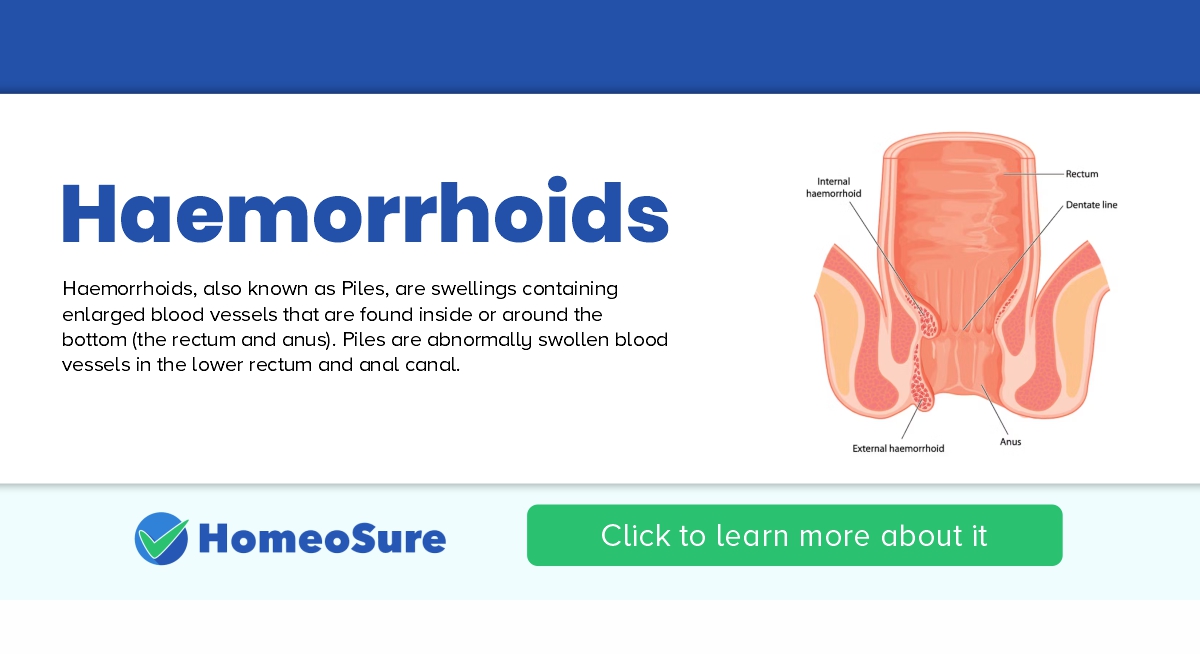Haemorrhoids
Haemorrhoids, also known as Piles, are swellings containing enlarged blood vessels that are found inside or around the bottom (the rectum and anus). Piles are abnormally swollen blood vessels in the lower rectum and anal canal.
Piles or haemorrhoids can be Internal or External depending on their location within the anal canal or outside it. The internal piles are graded into 4 grades depending on their protrusion outside the anal canal and the ease with which they are reduced or pushed back inside the anal canal.
CAUSES OF PILES
The exact cause of haemorrhoids is unclear, but they’re associated with increased pressure in the blood vessels in and around your anus. This pressure can cause the blood vessels in your back passage to become swollen and inflamed. These include the following:
- Genetic predisposition (weak rectal veins, walls)
- Poor muscle tone in the rectal region
- Constipation
- Obesity
- Sedentary lifestyle
- Chronic cough
- Pregnancy
- Overuse of laxatives or enemas
- Lifting heavy weights habitually
SYMPTOMS OF PILES
In many cases, haemorrhoids or Piles don’t cause symptoms, and some people don’t even realise they have them. However, when symptoms do occur, they may include:
- Bleeding after passing a stool (the blood is usually bright red)
- Itchy bottom
- A lump hanging down outside of the anus, which may need to be pushed back in after passing a stool
- A mucus discharge after passing a stool
- Soreness, redness and swelling around your anus
COMPLICATIONS
- Anemia or decreased hemoglobin level in the blood.
- Strangulation of the haemorrhoid when haemorrhoid tissue gets severely twisted causing extreme pain and infection.
- Thrombosis or clotting of blood inside the haemorrhoid leading to acute pain
- Faecal incontinence or accidental passage of solid or liquid stools from the rectum
- Anal stenosis when there is narrowing of anal canal leading to difficult and painful bowel movements.
MANAGEMENT OF PILES
Making lifestyle changes to reduce the strain on the blood vessels in and around your anus is often recommended which include:
- Increasing the amount of fibre in your diet – good sources of fibre include fruit, vegetables, wholegrain rice, whole wheat pasta and bread, pulses and beans, seeds, nuts and oats
- Drinking plenty of fluid – particularly water, but avoiding or cutting down on caffeine and alcohol
- Avoiding medication that causes constipation – such as painkillers that contain codeine
- Losing weight (if you’re overweight)
- Exercising regularly – can help prevent constipation, reduce your blood pressure and help you lose weight
- These measures can also reduce the risk of haemorrhoids returning, or even developing in the first place.
MANAGEMENT OF PILES
Homeopathic medicines are very effective in management of piles and the symptoms associated with it such as pain, bleeding, itching, etc. The condition has high relapse rate following surgical treatment, since surgery does not target the root causes like genetic tendencies, habitual constipation, etc.
Homeopathic medicines work at the root level and can modify these genetic tendencies thus reducing chances of relapse and recurrence of the condition significantly.
Homeopathic treatment is targeted towards UPROOTING THE DISEASE and ensuring health with no side effects. For prescribing to an individual, a PLAN OF TREATMENT is followed which involves:
- GETTING THOROUGH UNDERSTANDING OF CASE which includes complete case taking (analyzing patient as an individual) along with patient history and family history
- DIAGNOSIS OF PATIENT AND DISEASE
- INDIVIDUAL ASSESSMENT OF THE CASE
- PRESCRIBING THE MOST SUITABLE INDIVIDUAL CONSTITUTIONAL REMEDY
